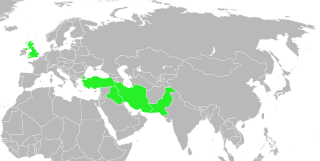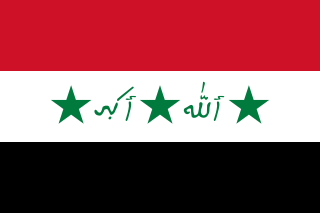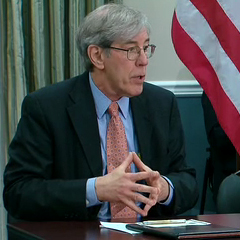Iraq is federal parliamentary representative democratic republic. It is a multi-party system whereby the executive power is exercised by the Prime Minister of the Council of Ministers as the head of government, as well as the President of Iraq, and legislative power is vested in the Council of Representatives.

The Middle East Treaty Organization (METO), also known as the Baghdad Pact and subsequently known as the Central Treaty Organization (CENTO), was a military alliance of the Cold War. It was formed in 1955 by Iran, Iraq, Pakistan, Turkey and the United Kingdom and dissolved in 1979.

The Coalition Provisional Authority was a transitional government of Iraq established following the invasion of the country on 19 March 2003 by the U.S.-led Multinational Force and the fall of Ba'athist Iraq.

The Institute for Fiscal Studies (IFS) is an economic research institute based in London, United Kingdom, which specialises in UK taxation and public policy. It produces both academic and policy-related findings.

The National Taxpayers Union (NTU) is a fiscally conservative taxpayer advocacy organization and taxpayers union in the United States, founded in 1977 by James Dale Davidson. NTU says that it is the oldest taxpayer advocacy organization in the nation. It is closely affiliated with a non-profit foundation, the National Taxpayers Union Foundation (NTUF). The organization has ranked politicians on their perceived fiscal responsibility, in the eyes of the National Taxpayers Union.

Nechirvan Idris Barzani is a Kurdish politician serving as the second President of Kurdistan Region, Iraq. He was elected into office by the Kurdistan Region Parliament in June 2019. Nechirvan Barzani was appointed as Vice President of the Kurdistan Democratic Party since 2010. He previously served as Prime Minister of the Kurdistan Regional Government from March 2007 to August 2009 and March 2012 to May 2019. Nechirvan Barzani is also the founder of the University Of Kurdistan - Hewler, the region's top ranking university located in Erbil. His rule combines of Kurdish nationalism, secularism, modernism and reforms, reforms in agriculture and women’s rights.
Education policy consists of the principles and policy decisions that influence the field of education, as well as the collection of laws and rules that govern the operation of education systems.
In May 2003, following the invasion of Iraq in March of that year, the Central Bank of Iraq-Development Fund for Iraq (DFI) account was created at the U.S. Federal Reserve Bank of New York at the request of the Coalition Provisional Authority (CPA) Administrator. A part of the fund has been transferred to Baghdad and Iraq, and the DFI-Baghdad account was opened at the Central Bank of Iraq "for cash payment requirements". The fund also eventually received money from seized and "vested" Iraqi bank accounts and funds seized by coalition forces. of this amount belongs to Uday Saddam Hussein, the older son of the former Iraqi president. The DFI have been disbursed mainly for "the wheat purchase program, the currency exchange program, the electricity and oil infrastructure programs, equipment for Iraqis security forces, and for Iraqi civil service salaries and ministry budget operations".
In the United States, federal mandates are orders that induce "responsibility, action, procedure or anything else that is imposed by constitutional, administrative, executive, or judicial action" for state and local governments and/or the private sector.
Education in Iraq is administered by the Ministry of Education.
Fiscal policy is considered any changes the government makes to the national budget in order to influence a nation's economy. The approach to economic policy in the United States was rather laissez-faire until the Great Depression. The government tried to stay away from economic matters as much as possible and hoped that a balanced budget would be maintained. Prior to the Great Depression, the economy did have economic downturns and some were quite severe. However, the economy tended to self-correct so the laissez faire approach to the economy tended to work.

The United States federal budget comprises the spending and revenues of the U.S. federal government. The budget is the financial representation of the priorities of the government, reflecting historical debates and competing economic philosophies. The government primarily spends on healthcare, retirement, and defense programs. The non-partisan Congressional Budget Office provides extensive analysis of the budget and its economic effects. It has reported that large budget deficits over the next 30 years are projected to drive federal debt held by the public to unprecedented levels—from 98 percent of gross domestic product (GDP) in 2020 to 195 percent by 2050.

The Department of Budget and Management is an executive body under the Office of the President of the Philippines. It is responsible for the sound and efficient use of government resources for national development and also as an instrument for the meeting of national socio-economic and political development goals.

The Consolidation of the Justice System in Albania (EURALIUS) was an EU funded technical assistance project that sought the strengthening of the Albanian Justice System. The objective of EURALIUS was to strengthen the independence, transparency, efficiency, accountability and public trust in the Albanian justice system in line with the EU Acquis and best practices. EURALIUS was composed of long-term international experts from various EU Member States and of Albanian legal professionals who act as national experts, as well as support staff consisting of project assistants, translators, etc.
Open government is the governing doctrine which sustain that citizens have the right to access the documents and proceedings of the government to allow for effective public oversight. In its broadest construction, it opposes reason of state and other considerations which have tended to legitimize extensive state secrecy. The origins of open-government arguments can be dated to the time of the European Age of Enlightenment, when philosophers debated the proper construction of a then nascent democratic society. It is also increasingly being associated with the concept of democratic reform. The United Nations Sustainable Development Goal 16 for example advocates for public access to information as a criterion for ensuring accountable and inclusive institutions.

The Ministry of Finance, Planning and Economic Development (MoFPED) is a cabinet-level government ministry of Uganda. Its mandate is to formulate sound economic and fiscal policies, mobilize resources for the implementation of government programmes, disburse public resources as appropriated by Parliament, and account for their use in accordance with national laws and international best practices. The cabinet minister of finance is Matia Kasaija. MoFPED was created by the 1995 Constitution of Uganda and derives its power from the Constitution and related acts of parliament, including the 2001 Budget Act and the 2003 Public Finance and Accountability Act.

The Office of the Parliamentary Budget Officer is an office of the Parliament of Canada which provides independent, authoritative and non-partisan financial and economic analysis. The office is led by the Parliamentary Budget Officer, an independent officer who supports parliamentarians in carrying out their constitutional roles of scrutinizing the raising and spending of public monies and generally overseeing the government's activities.
The Committee for a Responsible Federal Budget (CRFB) is a non-profit public policy organization based in Washington, D.C. that addresses federal budget and fiscal issues. It was founded in 1981 by former United States Representatives Robert Giaimo (D-CT) and Henry Bellmon (R-OK), and its board of directors includes former Members of Congress and directors of the Office of Management and Budget, the Congressional Budget Office and the Federal Reserve.

Douglas William Elmendorf is an American economist who is the dean and Don K. Price Professor of Public Policy at the John F. Kennedy School of Government. He previously served as the Director of the Congressional Budget Office (CBO) from 2009 to 2015. He was a Brookings Institution senior fellow from 2007 to 2009, and briefly in 2015 following his time at the CBO, and was a director of the Hamilton Project at Brookings.

Robert Danton Reischauer is an economist and was one of the two public trustees of the Medicare and Social Security Trust Fund. He is a nationally known expert on the federal budget, health reform, Medicare, and Social Security. Most recently (2000–2012) he served as president of the Urban Institute, a think tank based in Washington, D.C. He is the son of Japan scholar Edwin O. Reischauer.











